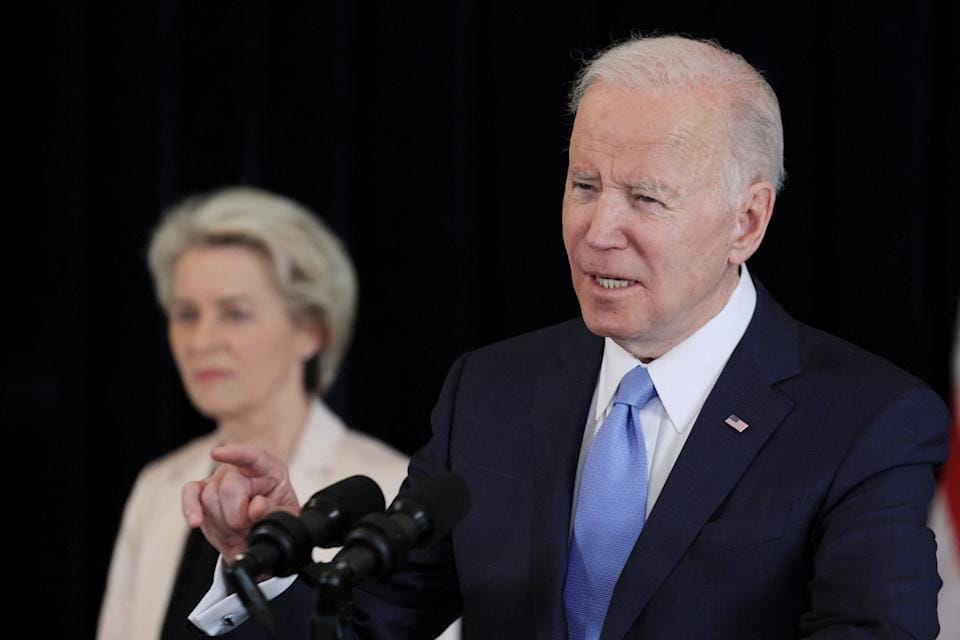EU Privacy Deal, NTIA Hires Digital Equity Director, FCC National Security Order
The privacy deal eases worries for American technology companies that sell consumer data.

March 25, 2022 – A provisional agreement may allow European’s personal information to be stored in the United States.
President Joe Biden and European Commission President Ursula von der Leyen announced on a deal on Friday that would resolve uncertainty about companies’ ability to send data between the U.S. and Europe.The European Union’s General Data Protection Regulation, or GDPR, is the EU’s comprehensive privacy law that places limits on technology companies’ ability to collect and share consumer’s personal information.
GDPR, which went into effect across the E.U. in 2018, is stricter than the U.S. privacy laws. Friday’s agreement strengthens the U.S.-E.U. Privacy Shield Framework, which provides a mechanism to comply with data protection requirements when transferring personal data from the European Union and Switzerland to the United States in support of transatlantic commerce.
Biden said Friday’s action establishes “unprecedented protections for data privacy and security for our citizens,” Biden said. “This new arrangement will enhance the Privacy Shield framework, promote growth and innovation in Europe and the United States, and help companies — both small and large — compete in the digital economy.”
Von der Leyen said the agreement “will enable predictable and trustworthy data flows between the EU and the U.S., safeguarding privacy and civil liberties.”
NTIA hires digital equity director
The National Telecommunications and Information Administration hired its first-ever digital equity director.
Cleveland-based digital equity advocate Angela Thi Bennett has been named to the job. She begins on Monday.
Thi Bennett comes from the Cleveland-based digital equity and literacy non-profit Digital C. She will move from her current position as DigitalC’s director of advocacy. She has worked for years with the National Digital Inclusion Alliance.
“Her local digital inclusion experience combined with her active national community involvement means she is equipped to understand the challenges and the need for holistic and collaborative solutions,” said Angela Siefer, executive director of NDIA.
This is the first-ever position in the federal government with “digital equity” in the job title.
Thi Bennett will be charged to direct the allocation of $2.75 billion from the Digital Equity Act and help develop guidelines for states to equitably use these funds.
“As my ability to serve scales to the national level, I remain steadfastly committed to amplifying marginalized voices, empowering local communities to drive solutions and creating shared standards of metrics to inform interventions and create accountability,” Thi Bennett said.
Founded in 2015, DigitalC has invested $12 million in technology infrastructure to establish a reliable, affordable wireless internet service provider, EmpowerCLE+, which currently has the capacity to serve 4,000 households in six of Cleveland’s least connected neighborhoods.
FCC network security order
The FCC on Friday added three companies to its list of business posing a threat to U.S. national security.
The agency listed AO Kaspersky Lab, China Telecom (Americas) Corp, and China Mobile International USA Inc. – to its list of communications equipment and services that have been deemed a threat to national security.
The list follows requirements from the Secure and Trusted Communications Networks Act of 2019 to investigate and report on services that are national security threats to American networks.
Chairwoman Jessica Rosenworcel said the updated list “is the latest in the FCC’s ongoing efforts, as part of the greater whole-of-government approach, to strengthen America’s communications networks against national security threats, including examining the foreign ownership of telecommunications companies providing service in the United States and revoking the authorization to operate where necessary.”
The Secure and Trusted Communications Networks Act requires the Commission to publish and maintain a list of communications equipment and services that pose an unacceptable risk to national security or the security and safety of U.S. persons.
The FCC says the initial list, which was published in March 2021, will be continually updated as other communications equipment and services meet the criteria under the law.








